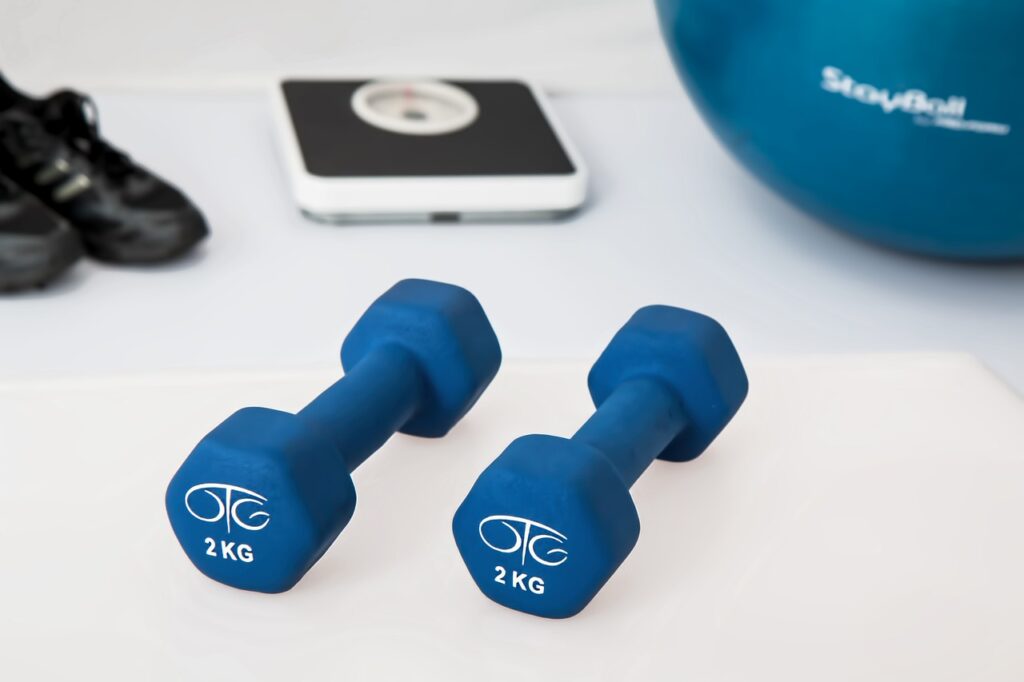The Power Of Regular Exercise: Benefits For Body And Mind

Are you looking for a simple way to improve both your physical and mental well-being? Look no further than the power of regular exercise. Engaging in regular physical activity not only has numerous benefits for your body, but it also plays a significant role in keeping your mind healthy and sharp. From boosting your mood and reducing stress to enhancing cognitive function and improving sleep, regular exercise proves to be a key ingredient for a happier and more fulfilling life. So, get ready to discover the transformative power of staying active and experience the incredible benefits it has to offer for both your body and mind.

Physical Benefits of Regular Exercise
Weight Management
Regular exercise plays a crucial role in maintaining a healthy weight. Engaging in physical activity helps to burn calories, which can contribute to weight loss or weight maintenance. Additionally, exercise can increase your metabolic rate, making it easier to maintain a healthy weight. Whether you prefer jogging, cycling, or strength training, incorporating regular exercise into your routine can help you achieve and maintain a healthy body weight.
Improved Cardiovascular Health
Regular exercise is fantastic for your heart. Engaging in aerobic activities like running, swimming, or cycling can improve cardiovascular health by strengthening the heart muscle and improving circulation. By participating in regular exercise, you can reduce the risk of cardiovascular diseases such as heart attacks, high blood pressure, and stroke.
Increased Muscle Strength and Endurance
Exercise doesn’t just benefit your heart, but your muscles as well. Regular workouts help to build and strengthen muscles, increasing your overall muscle strength and endurance. Engaging in strength training exercises, such as weightlifting or bodyweight exercises, can promote muscle growth, improve bone density, and enhance overall physical performance.
Enhanced Flexibility and Balance
Regular exercise can also improve your flexibility and balance. Activities like yoga or Pilates can increase your range of motion and help you become more flexible. This not only improves overall physical performance but also reduces the risk of injuries. Additionally, balance exercises such as tai chi can enhance stability and proprioception, reducing the likelihood of falls and injuries, especially as you age.
Reduced Risk of Chronic Diseases
Engaging in regular exercise can significantly reduce the risk of chronic diseases. Physical activity helps to control blood sugar levels, reduce cholesterol levels, and improve insulin sensitivity, reducing the risk of developing conditions like type 2 diabetes. Furthermore, regular exercise can also lower the risk of various health issues such as certain types of cancers, osteoporosis, and metabolic syndrome.
Mental Benefits of Regular Exercise
Stress Reduction
Regular exercise is an excellent way to alleviate stress and tension. Engaging in physical activity stimulates the production of endorphins, which are natural mood lifters. These endorphins help to reduce stress levels, providing a sense of relaxation and calm. Whether it’s going for a jog, hitting the gym, or participating in a group fitness class, exercise can be a powerful stress management tool.
Improved Mood and Mental Well-being
Exercise has been shown to significantly improve mood and overall mental well-being. Physical activity releases neurotransmitters like serotonin, dopamine, and norepinephrine, which are known to boost mood and reduce symptoms of depression and anxiety. Regular exercise can help you feel happier, more relaxed, and better equipped to deal with the challenges of daily life.
Boosted Cognitive Function
Regular exercise doesn’t just benefit the body; it also enhances brain function. Engaging in physical activity increases blood flow to the brain, delivering oxygen and nutrients that support optimal cognitive function. Studies have shown that regular exercise can improve memory, attention span, and mental clarity, helping you stay sharp and focused.
Increased Energy and Productivity
If you often find yourself feeling sluggish and low on energy, regular exercise can be a game-changer. Engaging in physical activity boosts energy levels by increasing blood flow and oxygen to the muscles and organs. Regular exercise also promotes better sleep, which is crucial for maintaining optimal energy levels throughout the day. By incorporating exercise into your routine, you can experience increased productivity and improved overall energy levels.
Better Sleep Patterns
Sleep is essential for overall well-being, and regular exercise can significantly improve sleep patterns. Engaging in physical activity helps regulate the sleep-wake cycle, also known as the circadian rhythm. Regular exercise helps to promote a deeper, more restorative sleep, reducing the likelihood of insomnia and enhancing overall sleep quality.
Psychological Benefits of Regular Exercise
Improved Self-confidence
Regular exercise can have a profound impact on self-confidence and self-esteem. As you engage in physical activity and see progress in your fitness and health goals, it naturally boosts your self-confidence. Exercise allows you to set and achieve goals, which contributes to a positive self-image and a greater sense of self-worth.
Enhanced Body Image
Regular exercise can help improve body image and promote a healthy relationship with your body. Engaging in physical activity helps to tone muscles, improve posture, and increase overall body strength. As you become more physically fit, you may also notice positive changes in your body composition, leading to a more positive perception of your physical appearance.
Reduced Symptoms of Anxiety and Depression
Exercise has been shown to be an effective complementary treatment for anxiety and depression. Physical activity stimulates the release of endorphins, which help to improve mood and reduce symptoms of both anxiety and depression. Regular exercise can provide a natural boost in mood, reducing feelings of sadness, anxiety, and stress.
Enhanced Stress Coping Mechanisms
Regular exercise can enhance your ability to cope with stress. Engaging in physical activity acts as a form of healthy distraction, diverting your focus from stressors and promoting relaxation. Additionally, regular exercise can provide a sense of control and mastery, helping you better navigate through stressful situations.
Increased Relaxation and Mindfulness
Physical activity, such as yoga or tai chi, can promote relaxation and mindfulness. These activities focus on the mind-body connection, combining movement with deep breathing and meditation. Engaging in such exercises can help reduce stress, promote relaxation, and enhance overall mindfulness.
Social Benefits of Regular Exercise
Opportunities for Social Interaction
Regular exercise can provide opportunities for social interaction and connection. Whether you join a sports team, participate in group fitness classes, or simply work out with a friend, physical activity can help foster new relationships and strengthen existing ones. Engaging in exercise with others can provide motivation, accountability, and a sense of camaraderie.
Boosted Motivation and Accountability
Exercising with others can boost motivation and accountability. When you have a workout partner or participate in group activities, you are more likely to stick to your exercise routine and push yourself harder. The support and encouragement from others can make a significant difference in your ability to achieve your fitness goals.
Development of Time Management Skills
Regular exercise requires a commitment of time and effort. By incorporating exercise into your routine, you can develop time management skills and prioritize your well-being. Learning to manage your schedule effectively to include physical activity can improve overall time management skills and help you make self-care a priority.
Joining Supportive Fitness Communities
Regular exercise provides an opportunity to join supportive fitness communities. Whether it’s a gym, a running club, or a yoga class, participating in group activities allows you to connect with like-minded individuals who share similar goals and interests. Being part of a supportive fitness community can provide motivation, guidance, and a sense of belonging.
Enhanced Teamwork and Cooperation
Participating in team sports or group activities promotes teamwork and cooperation. Engaging in these activities fosters skills such as communication, collaboration, and problem-solving. Regular exercise in a group setting can help develop these valuable social skills while providing a sense of unity and shared goals.

Prevention and Management of Chronic Conditions
Lowered Risk of Heart Disease
Regular exercise is one of the most effective ways to reduce the risk of heart disease. Physical activity helps to lower blood pressure, reduce cholesterol levels, and improve overall cardiovascular function. By incorporating regular exercise into your routine, you can significantly reduce the risk of developing heart-related conditions such as heart attacks, stroke, and heart failure.
Reduced Risk of Type 2 Diabetes
Engaging in regular exercise can help prevent and manage type 2 diabetes. Physical activity helps to improve insulin sensitivity and regulate blood sugar levels, reducing the risk of developing diabetes. Regular exercise, combined with a healthy diet, can contribute to better insulin control and overall metabolic health.
Management of High Blood Pressure
Regular exercise can also help in managing high blood pressure. Physical activity strengthens the heart muscle, improves blood flow, and reduces the workload on the heart. By engaging in regular exercise, you can lower blood pressure and improve overall cardiovascular health.
Improved Bone Density and Strength
Exercise, particularly weight-bearing exercises, helps to promote strong and healthy bones. Regular weightlifting, jogging, or dancing can increase bone density and reduce the risk of osteoporosis. Especially for women, regular exercise can be crucial in maintaining bone health and reducing the likelihood of fractures and bone-related conditions.
Reduced Symptoms of Arthritis
Regular exercise can be beneficial for individuals with arthritis. Engaging in low-impact activities such as swimming, cycling, or gentle yoga can help relieve joint pain, improve joint mobility, and enhance overall flexibility. Exercise helps to strengthen the muscles surrounding the joints, providing stability and support.
Enhanced Cognitive Function and Brain Health
Improved Memory and Learning
Regular exercise has been linked to improved memory and learning capabilities. Physical activity increases blood flow to the brain, encouraging the growth of new neurons and enhancing neural connections. As a result, regular exercise can improve memory retention, cognitive function, and overall brain health.
Reduced Risk of Cognitive Decline
Engaging in regular exercise can help protect against age-related cognitive decline and neurodegenerative diseases such as Alzheimer’s. Physical activity stimulates the release of growth factors in the brain, promoting the growth of new cells and protecting existing ones. Regular exercise can significantly reduce the risk of cognitive decline and maintain optimal brain function as you age.
Increased Neuroplasticity
Physical exercise enhances neuroplasticity, which is the brain’s ability to adapt and reorganize itself. Engaging in activities that challenge the brain, such as aerobic exercise and coordination exercises, can promote the formation of new neural pathways, improving overall brain function and performance.
Enhanced Brain Structure and Function
Regular exercise has been shown to have positive effects on brain structure and function. It can increase the volume of certain brain regions, such as the hippocampus, responsible for memory, and the prefrontal cortex, involved in decision-making and cognitive control. By incorporating regular exercise into your routine, you can support optimal brain structure and function.
Improved Focus and Concentration
Exercise has a direct impact on attention, focus, and concentration. Engaging in physical activity has been shown to improve cognitive performance, including attention span and information processing. By incorporating exercise into your routine, you can enhance your ability to concentrate, both in work and daily life.

Exercise and Stress Management
Release of Endorphins
One of the most well-known benefits of exercise is the release of endorphins, which are natural mood-enhancers. Endorphins help to reduce stress and pain, and they create a sense of well-being and happiness. Regular exercise can be a great way to naturally boost your mood and manage stress.
Reduction of Stress Hormones
Exercise has been shown to reduce levels of stress hormones, such as cortisol, which can contribute to stress and anxiety. Regular physical activity helps regulate the body’s stress response, promoting a more balanced physiological state. By engaging in exercise, you can reduce stress hormone levels and manage stress more effectively.
Increase in Brain-Derived Neurotrophic Factor (BDNF)
Regular exercise increases the production of brain-derived neurotrophic factor (BDNF), a protein that plays a crucial role in brain health. BDNF helps to protect and repair brain cells, improve cognitive function, and enhance overall brain health. By engaging in regular exercise, you can promote the production of BDNF and support optimal brain function.
Improved Stress Response
Regular exercise helps to improve the body’s stress response. Physical activity provides a healthy outlet for built-up stress and tension, reducing the likelihood of stress-related symptoms. By engaging in exercise, you can improve your ability to cope with stress and maintain a more balanced state of well-being.
Enhanced Ability to Cope with Daily Stressors
Exercise can equip you with improved coping mechanisms to deal with daily stressors. Regular physical activity acts as an outlet for stress, providing a distraction and promoting relaxation. Engaging in exercise can help you develop healthier ways of managing stress, reducing the impact of daily stressors on your overall well-being.
Positive Impact on Mental Health
Relief of Symptoms of Depression
Regular exercise can significantly alleviate symptoms of depression. Exercise stimulates the release of endorphins and other neurotransmitters, which can improve mood and reduce feelings of depression. Engaging in physical activity may help regulate brain chemicals and create a sense of well-being, which can contribute to the relief of symptoms associated with depression.
Alleviation of Anxiety
Exercise has been shown to be an effective way of reducing symptoms of anxiety. Physical activity helps to release tension, reduce muscle tension, and promote relaxation. Regular exercise can provide a natural and healthy way to manage anxiety symptoms and create a sense of calm and control.
Boosted Mood and Feelings of Happiness
Engaging in regular exercise has a significant impact on mood and happiness levels. Physical activity stimulates the production of endorphins, neurotransmitters that contribute to a sense of happiness and well-being. By incorporating exercise into your routine, you can boost your mood and experience increased feelings of happiness and fulfillment.
Enhanced Self-esteem and Self-worth
Regular exercise plays a vital role in enhancing self-esteem and self-worth. Achieving fitness goals, improving physical performance, and experiencing the positive effects of exercise can boost self-confidence and promote a positive self-image. Engaging in regular exercise can help you feel more confident, resilient, and proud of your accomplishments.
Reduction in Symptoms of ADHD
Exercise has been shown to be beneficial for individuals with attention deficit hyperactivity disorder (ADHD). Regular physical activity can help improve focus, attention, and impulse control. Engaging in exercise can provide a healthy outlet for excess energy and may help manage symptoms associated with ADHD.

Improved Sleep Patterns and Quality
Increased Sleep Duration and Quality
Regular exercise can improve both the duration and quality of sleep. Physical activity helps to regulate the sleep-wake cycle, promoting a more regular sleep pattern. Engaging in exercise can increase the time spent in deep, restorative sleep, providing you with a more refreshing and rejuvenating night’s rest.
Regulation of Circadian Rhythm
Exercise plays a significant role in regulating the circadian rhythm, also known as the internal body clock that controls sleep-wake cycles. Regular physical activity helps align your body’s natural rhythms, making it easier to fall asleep and wake up at consistent times. By incorporating exercise into your routine, you can support a healthier circadian rhythm and improve overall sleep patterns.
Reduction in Insomnia Symptoms
For individuals struggling with insomnia, regular exercise can help alleviate sleep difficulties. Engaging in physical activity can reduce the time it takes to fall asleep, decrease nighttime awakenings, and improve overall sleep quality. By incorporating exercise into your routine, you can improve insomnia symptoms and enjoy better sleep.
Enhanced Sleep Efficiency
Sleep efficiency refers to the amount of time spent asleep compared to the time spent in bed. Regular exercise can improve sleep efficiency by reducing the time spent lying awake in bed. Engaging in physical activity promotes a healthier sleep-wake cycle, reducing sleep disturbances and improving overall sleep efficiency.
Improved Daytime Alertness
Getting regular exercise not only improves sleep quality but also enhances daytime alertness. Engaging in physical activity promotes a sense of wakefulness and energy during the day, reducing daytime sleepiness and fatigue. By incorporating regular exercise into your routine, you can experience improved overall alertness and productivity.
Holistic Approach to Well-being
Improved Overall Quality of Life
Regular exercise contributes to an improved overall quality of life. Engaging in physical activity promotes physical fitness, reduces the risk of chronic disease, and enhances mental well-being. By incorporating exercise into your routine, you can enjoy a higher quality of life, with increased energy levels, improved mood, and a greater sense of overall well-being.
Increased Longevity and Aging Well
Regular exercise is closely associated with increased longevity and healthy aging. Engaging in physical activity can help maintain physical and cognitive functioning as you age, reducing the risk of age-related diseases and disabilities. Regular exercise promotes longevity by supporting optimal overall health and well-being.
Enhanced Physical and Mental Resilience
Regular exercise helps build physical and mental resilience. Engaging in physical activity improves physical fitness, strengthens the immune system, and enhances mental well-being. By regularly challenging yourself physically, you can increase your resilience to stress, illness, and other life challenges.
Combating the Sedentary Lifestyle
In today’s sedentary world, regular exercise is vital for combating the negative effects of a sedentary lifestyle. Engaging in physical activity can counteract the risks associated with prolonged sitting and promote a healthier lifestyle. Regular exercise helps to improve cardiovascular health, maintain a healthy weight, and reduce the risk of chronic diseases.
Promotion of a Balanced and Healthy Lifestyle
Incorporating regular exercise into your routine promotes a balanced and healthy lifestyle. Physical activity is just one aspect of overall well-being, and by engaging in regular exercise, you’re more likely to adopt other healthy habits like eating a nutritious diet and managing stress. Regular exercise sets the foundation for a holistic and healthy approach to life.
In conclusion, the power of regular exercise extends far beyond mere physical fitness. Engaging in regular physical activity offers numerous benefits for both the body and mind. From weight management and cardiovascular health to stress reduction and improved sleep patterns, exercise has the potential to enhance multiple aspects of our well-being. Additionally, regular exercise contributes to the prevention and management of chronic conditions, enhances cognitive function and brain health, provides stress relief and positive mental health outcomes, and promotes social interaction and overall well-being. By incorporating regular exercise into your lifestyle, you can experience the transformative power of physical activity and unlock a healthier, happier, and more balanced life.




Leave a Reply